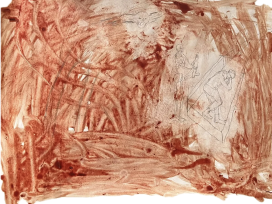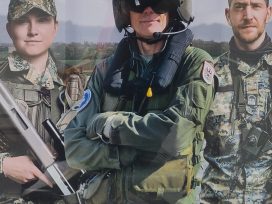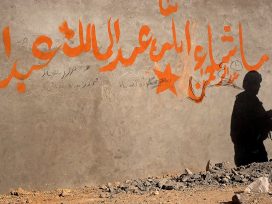No peace without freedom, no justice without law
On the occasion of Europe Day, Oleksandra Matviichuk, Ukrainian human rights defender and director of the Nobel Peace Prize-winning Center for Civil Liberties, delivered this year’s Speech to Europe at Vienna’s Judenplatz.
The following transcript was provided by Documenting Ukraine, Institute for Human Sciences (IWM). The Speech to Europe is an annual event jointly organized by the IWM, the ERSTE Foundation, and Wiener Festwochen in cooperation with the Jewish Museum Vienna.
The Europe with a future: Values must be defended
When you know history, it is impossible to idealize. The twentieth century brought two devastating world wars, terrible colonial wars, millions of deaths, and the complete dehumanization of humankind, which reached its most concrete form in the Holocaust and Nazi concentration camps. The horrific lessons of the past demanded decisive action. Responsibility for what had been perpetrated was codified in the slogan ‘Never again’. Governments created the United Nations system and signed international agreements. The Schuman Declaration inaugurated a unified European project. The idea that every person is free and equal in dignity and rights came to characterize the new postwar humanism.
But evil cannot be vanquished once and for all. Each day we make a choice. And democracy, the rule of law, and human rights were realized in practice in only part of Europe. Meanwhile, the totalitarian Soviet Gulag was never condemned or punished. There has been no accountability. And thus evil keeps coming back: the Srebrenica massacre; the destruction of Grozny, a city of half a million people; the Russian bombardment of Aleppo; the firebombing of Mariupol and the bodies of people killed on the streets of Bucha.
Now, in the twenty-first century, how will we defend human beings, their dignity, their rights and their freedom? Can we rely on the law – or do only weapons matter?
I pose these questions not only as the citizen of a country that is defending itself against Russian military aggression. I pose these questions as a citizen of Europe.
Europe must respond to the challenges of today’s world. Europe must fulfil its role in a globalized world that is seeing a standoff between authoritarianism and democracy, interests and values, might and law, quick profits and long-term perspectives. It is the determination to act that gives a society a future.
The Europe that succeeded
The European Coal and Steel Community was not only intended to provide a shared foundation for economic development. The efforts of those who worked to build a shared European project brought solidarity to countries whose relations had long been clouded by bloody conflicts. The European Union was able to overcome that history and ensure peaceful relations among member states. Governments’ ongoing efforts to uphold democracy, the rule of law, and human rights brought decades of stable growth. This is the Europe that succeeded in avoiding war.
The Europe that succeeded continues down a difficult path towards finding itself. It must learn to see the toxic legacy of its own colonial past, even if it is now wrapped in newfound good intentions. Its task lies in building unity, but not uniformity; ensuring integrity, but not homogeneity. It must find a way to build solidarity out of diversity. It must not allow the ideas of authoritarianism and imperialism to take hold among new generations.

Detail of the Holocaust Memorial, Judenplatz, Vienna. Artist: Rachel Whiteread. Image by Robert Scarth via Wikimedia Commons
The generations that lived through the Second World War are almost gone. The generations that came after have not been forced to shed their own blood. They inherited the values of democracy from their parents. And they began to take rights and freedom as a given. People behave increasingly not as the bearers of these values but as their consumers. They have begun to understand freedom as the choice between types of cheese at the supermarket. And so they are ready to trade freedom for economic gain, for promises of security, and for personal comfort. It should come as no surprise that in developed democracies we see populist forces gaining strength, forces that cast doubt on the foundational principles of the Universal Declaration of Human Rights.
Our world has become fast-paced, complex and interconnected. Technological development, climate change, invasions of privacy, growing inequality, the devaluation of knowledge and expertise, and other global challenges demand answers that cannot be found in the past. Decades of relative comfort and a growing desire for simple solutions changed the optics of developed democracies. They no longer realize that peace in Europe cannot be preserved without efforts equal to the level of the threat that is posed.
The European Union does not encompass all of Europe. The EU is the part of Europe that managed to take the principle that peace, progress and human rights are indelibly linked, and put it into practice. And then it found itself faced with the challenge of stagnation. The Europe that succeeded should support other countries’ movement towards European values. In an ever-changing world, it is open systems and transformational cultures that survive. And walls and borders will not save us from global challenges. To stop moving forward is to perish.
The current situation depends not only on the decisions and actions of the Europe that succeeded but also on its surroundings. It is one thing to be surrounded by countries that have also set the values of democracy, rule of law and human rights as their guiding lights. It is an entirely different matter to be surrounded by countries who see these values as inimical. Once they are strong enough, they will seek to destroy you.
For a long time, the Europe that succeeded failed to take responsibility towards other countries in the region and made it possible for authoritarian regimes to become entrenched. This Europe forgot that states that kill journalists, imprison activists and break up peaceful protests pose a danger not only to their own citizens. Such states are a threat to the entire region and indeed the entire world. Europe needed to respond to systematic violations of human rights. Human rights should play no less central a role in political decision-making than economic gain or security. This applies to foreign policy as well.
One clear example is Russia, which destroyed its own civil society step by step. But for a long time, the developed democracies turned a blind eye to this. They continued to shake hands with the Russian leadership, building gas pipelines and carrying on business as usual. For decades Russian troops committed crimes in multiple countries. But there were no consequences. The world scarcely blinked at the annexation of Crimea by military force, which was unprecedented in post-war Europe. Russia believed that it could do whatever it wanted.
The Europe that failed
In February 2014 Russia began a war against Ukraine, occupying the Crimean Peninsula and part of the Donetsk and Luhansk regions. This was just after the Revolution of Dignity had ended in Ukraine. Millions of people had bravely stood up against a corrupt authoritarian regime. They took to the streets across the entire country, demanding that the regime continue moving towards Europe, towards genuine democratic values. They fought for the right to build a state in which the rights of each person are protected, in which the authorities are held accountable, in which the courts are independent, and in which the police do not beat peaceful student demonstrators.
And some of them paid the ultimate price for this. The police shot more than one hundred peaceful demonstrators in the center of the nation’s capital. People died under the flags of Ukraine and the European Union.
When the authoritarian regime fell, Ukraine got its chance for democratic transformation. And to stop Ukraine’s progress towards genuine democracy, Russia invaded. Russia began this war in February 2014, and then in February 2022 it expanded it into a full-scale invasion. Because it is not NATO that Putin fears, it is democracy. Dictators fear the idea of freedom.
Now Russia seeks to break Ukraine’s resistance and occupy the country by inflicting maximum pain on the civilian population. Russian forces are deliberately targeting residential buildings, churches, schools, museums and hospitals. They are shooting at evacuation corridors. They are imprisoning people in filtration camps. They are forcibly deporting Ukrainians. They are kidnapping, torturing and murdering people in the occupied territories. Europe failed to stop this.
This is a war of values. Russia is seeking to convince the Ukrainian nation that its choice in favour of European integration was a mistake. Russia is seeking to convince the entire world that democracy, the rule of law and human rights are fake, that they are false values. Because in wartime they do not protect anyone. Russia is seeking to prove that a state with a powerful military and nuclear weapons can dictate the rules of the game to the entire international community and can even change internationally recognized borders.
So this is not a war between two countries, it is a war between two systems – tyranny and democracy. The war is already here. People only begin to understand this when the bombs are falling on their heads, but this war has dimensions other than the military one: it is an economic war, an information war, a war of values. Whether we are brave enough to admit it or not, this war has long since crossed the borders of the European Union.
Russia has declared war on Europe. Russia is fighting against the values that are Europe’s hallmark.
Europe must take responsibility. Democracy, the rule of law and human rights cannot be fought for and won once and for all. The values of modern civilization must be defended. We have to fight for them.
The Europe that is afraid
Europe does not know how to stop the war. Some voices repeatedly call on Ukraine to accept peace.
People in Ukraine want peace more than anyone else. But peace does not come when the country that was attacked lays down its weapons. That’s not peace, that’s occupation. And occupation is just war in another form.
Russia has introduced a reign of terror on the occupied territories, to keep them under control. This means that Russian troops and special forces exterminate local leaders – mayors, civil society activists, journalists, volunteers, priests and artists. Without regard for age, sex or health. People have no chance to defend their freedom, their property, their lives and the lives of their loved ones.
Occupation is not a matter of exchanging the flag of one state for that of another. Occupation brings torture, deportation, forced adoption, denial of identity, filtration camps, mass graves.
In one of these mass graves, in the liberated Kharkiv region, under marker number 319 the body of Volodymyr Vakulenko was found. Volodymyr was a children’s author. He wrote wonderful stories for children and entire generations grew up on his books. During the Russian occupation, Volodymyr disappeared. His family hoped until the very end that he was alive, that he was in Russian captivity, like thousands of other people. It is hard for them to accept the forensic results that identified his body.
Sustainable peace means the freedom to live without fear, the freedom to make plans for the future. We need to stop disguising military threats as ‘political compromises’. Calls for Ukraine to stop defending itself just to satisfy Russia’s imperial appetites are not merely misguided. They are immoral.
People cannot be abandoned in the occupied territories to face death and torture. People’s lives cannot be a ‘political compromise’. Fighting for peace means not succumbing to pressure from the aggressor, it means defending people from its cruelty.
Russia is a modern-day empire. The imprisoned peoples of Belarus, Chechnya, Dagestan, Tatarstan, Yakutiia and others endure forced russification, the expropriation of natural resources, and prohibitions on their own language and culture. They are forced to give up their identity. Empire has a centre, but it has no borders. Empire always seeks to expand. If Russia is not stopped in Ukraine, it will go further.
This is not one person’s war. It is a war waged by a nation whose longing to regain ‘Russian greatness’ has robbed it of the ability to distinguish between good and evil. So they rejoice over capturing Ukrainian territories. So they denounce each other. 12-year-old Masha Moskalyova drew an anti-war picture at school. Someone informed the authorities and now her father is in prison and she is in an orphanage.
The Russian people will bear responsibility for this shameful page in their history and for seeking to resurrect their former empire by force. Being aware of this responsibility brings honest people to take a stand against evil and call things by their names, even when it goes against prevailing public opinion. In Russia today there are very, very few of these people, but it is precisely thanks to their courage that Russians will never be able to say that they did not know.
Since the full-scale invasion began, Ukraine has withstood thanks to the readiness of the people of Ukraine to defend freedom and democracy, but also thanks to the support of developed democracies. They said, ‘Let’s help Ukraine not lose’. Now they say, ‘We’re with you as long as it takes’. But the paradigm needs to be changed. Rather than helping Ukraine not to lose, these states need to think and act in ways that help Ukraine win. Quickly.
The Europe that is afraid is tempted to avoid tough decisions. Responsible decisions. The Europe that is afraid behaves as if global challenges will somehow just disappear one day. But in reality, they are only getting worse. We are just wasting time.
The Europe with a future
War turns people into numbers. The scale of war crimes grows so fast that it is simply impossible to tell everyone’s stories. But I will tell you one. The story of Svitlana, who lost her entire family when a Russian missile hit her building.
‘I heard them dying. My husband was breathing heavily, straining as if he was trying to throw the rubble off of himself, but he couldn’t. At some point he just went still. My grandmother and Zhenya died instantly. I heard my daughter crying. Then she also went quiet. As for my son, my mother told me that he called for me several times and then… nothing.’
As long as the military dimension of this war is confined within the borders of Ukraine, the Europe that succeeded can turn off the news of war crimes. They can avoid looking at the horrifying photos and videos. Millions of people in Ukraine cannot do this. We cannot just turn off the war. This horror is now our life.
People are not numbers. We must ensure justice for all people, regardless of who they are, regardless of their social status, regardless of the type of crime and violence they endured, regardless of whether foreign media and international organizations take an interest in their fate. We must give people back their names. And their human dignity. Because every person’s life matters.
We still view the world through the lens of the Nuremburg trials, where war criminals were convicted only after the Nazi regime had fallen. But justice should not depend on the durability of authoritarian regimes. After all, we live in a new century. Justice should not wait.
It is up to us to break this cycle of impunity and change our approach to justice for war crimes. We must create an international tribunal and bring Putin, Lukashenka and other war criminals to justice. Yes, this is a bold step. But we must demonstrate that democracy is effective, that the rule of law works, and that justice prevails – even when it is delayed.
This is a job for the Europe that determines its own future. To be European means to demonstrate solidarity in this fight for the values of democracy, rule of law and human rights. Not striking a pose but taking an active part.
It is not only a question of how we will protect human beings in the twenty-first century. Thanks to its multiculturalism and its complex history, Europe has the potential to rethink what humanism means in an era of rapid technological progress, and to give new dimensions to the meaning of humanity.
The Europe that succeeded can help build a world that succeeds. Europe can play a key role in creating an international system of cooperation that brings together developed democracies and states that are on the path to democracy. This union should be determined not by a shared past, economic development or geographical continent, but by common values and attitudes.
Because human rights are about a way of thinking, about a particular paradigm of perceiving the world, that determines how a person thinks and acts. So it is not enough to pass the right laws or create formal institutions. A society’s values are stronger than any laws or institutions.
We need a new humanistic movement that will work with society on the level of meaning, which will focus on education, which will shape mass support and inspire people to defend rights and freedoms. This movement should bring together intellectuals and civil societies from many countries, since the ideas of freedom and human rights are universal.
When the law temporarily fails, and we cannot rely on it, we can still always rely on people. Even if we do not have the political tools, our word and commitments always remain. Ordinary people have much more power than they themselves realize. The voice of millions of people in many countries can change the world faster than any intervention by the United Nations.
Our future is undetermined and unguaranteed. Twenty-first century Europe can become a world of humanism, or it can again shock the world with crimes of unprecedented brutality. Europe bears a shared responsibility to respond to global challenges and embark on a new path of mutual understanding.
Europe is less about geography than about the values of modern society. We live in a world where values have no national borders. And only by spreading the idea of freedom can we make our world secure.
Published 24 May 2023
Original in English
First published by Institute for Human Sciences (IWM)
Contributed by Institute for Human Sciences (IWM) © Oleksandra Matviichuk / Institute for Human Sciences (IWM)
PDF/PRINTIn collaboration with
In focal points
- Not epistemic enough to be discussed
- Another lost generation of art?
- A trace of Russia at the heart of Austria
- What makes a humanist kill?
- Something happens, somewhere
- Vertical occupation
- No longer a footnote
- The Ides of March
- Counteroffensive exhibitions
- No peace without freedom, no justice without law
Newsletter
Subscribe to know what’s worth thinking about.
Related Articles

For those who suffered the consequences of Yalta’s division of Europe, the Helsinki Final Act brought grounds for optimism. Today, as Russia’s regressive war on Ukraine reopens old conflicts, it stands as a monument to European modernity.

Artist Marharyta Polovinko’s creativity persisted in a tormented form through her experiences as a soldier on the Ukrainian frontline. The words of a recently called-up fellow creative and young family man provide a stark reminder that the Ukrainian military is buying Europeans time.






